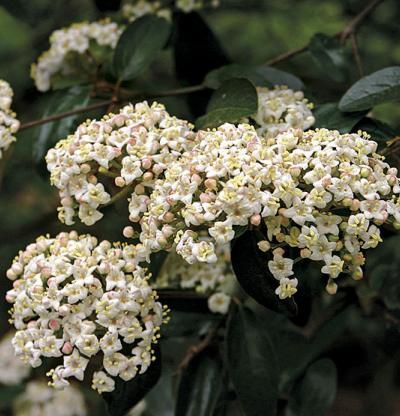





 (Viburnum × burkwoodii 'Conoy')
vy-BURN-um ex burk-WOOD-ee-eye
Genus:
Viburnum
This small deciduous shrub is covered in early spring with pink buds that burst open to reveal slightly fragrant, showy, flat-topped white flowers. Fleshy red fruit is borne in pendulous bunches in late August, darkening to all-black in October. Leaves fade to a dark maroon in the fall and winter months when planted in colder areas. Plants grow to about 5 feet tall and 8 feet wide. A cross between V. utile and V. × burkwoodii ‘Park Farm Hybrid’, this shrub is excellent as a foundation plant, as a specimen, in mass groupings, in a shrub border, or in containers. Evergreen to Zones 7 and 8.
Care:
Provide moist, well-drained, slightly acidic soil in full sun to part shade. Site near other Viburnum species to ensure good cross-pollination and fruit set. Once established, this plant is tolerant of drought and reflected heat from home foundations.
Propagation:
Take greenwood cuttings in summer.
Problems:
Gray mold (Botrytis), rust, downy mildew, powdery mildew, wood rot, Verticillium wilt, leaf spots, and dieback. Aphids, scale insects, weevils, Japanese beetles, Viburnum beetles, mealybugs, and tree hoppers.
(Viburnum × burkwoodii 'Conoy')
vy-BURN-um ex burk-WOOD-ee-eye
Genus:
Viburnum
This small deciduous shrub is covered in early spring with pink buds that burst open to reveal slightly fragrant, showy, flat-topped white flowers. Fleshy red fruit is borne in pendulous bunches in late August, darkening to all-black in October. Leaves fade to a dark maroon in the fall and winter months when planted in colder areas. Plants grow to about 5 feet tall and 8 feet wide. A cross between V. utile and V. × burkwoodii ‘Park Farm Hybrid’, this shrub is excellent as a foundation plant, as a specimen, in mass groupings, in a shrub border, or in containers. Evergreen to Zones 7 and 8.
Care:
Provide moist, well-drained, slightly acidic soil in full sun to part shade. Site near other Viburnum species to ensure good cross-pollination and fruit set. Once established, this plant is tolerant of drought and reflected heat from home foundations.
Propagation:
Take greenwood cuttings in summer.
Problems:
Gray mold (Botrytis), rust, downy mildew, powdery mildew, wood rot, Verticillium wilt, leaf spots, and dieback. Aphids, scale insects, weevils, Japanese beetles, Viburnum beetles, mealybugs, and tree hoppers.
Copyright © www.100flowers.win Botanic Garden All Rights Reserved